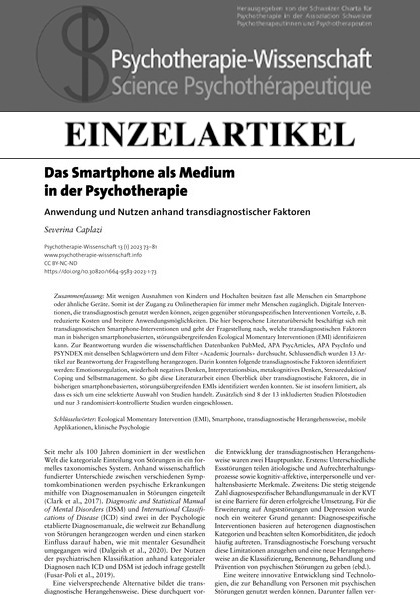The smartphone as a tool in psychotherapy
Use and benefit on the basis of transdiagnostic factors
DOI:
https://doi.org/10.30820/1664-9583-2023-1-73Keywords:
Ecological Momentary Intervention (EMI), Smartphone, transdiagnostic approach, mobile applications, clinical psychologyAbstract
With the exception of some children and elderly people, nearly everyone is using a smartphone or a similar device. By this, online interventions get easier to access for more people. Digital interventions, which can be used transdiagnostic, show some advantages, compared to disorder specific interventions (e. g. less costs and a broader use). The here discussed literature review evaluated transdiagnostic factors, that were identified in previous Smartphone based Ecological Momentary Interventions (EMI) for various psychological disorders. The scientific databases PubMed, APA PsycArticles, APA PsycInfo und PSYNDEX were searched through with the same search terms and with a filter for academic journals only. Out of this, 13 articles were extracted. Ultimately, the following transdiagnostic factors were identified: emotion regulation, repetitive negative thinking, self-management, metacognitive thinking, stress-reduction/coping, and interpretation bias. Overall, this literature review gives an overview of transdiagnostic factors that were targeted in previous EMIs for Smartphones. One limitation of the stated study is that the included studies are a selected sample, from which 8 out of 13 studies were pilot studies. However, 3 randomised controlled trials and one literature review were also included.
Downloads
How to Cite
Caplazi, S. (2023). The smartphone as a tool in psychotherapy: Use and benefit on the basis of transdiagnostic factors. Psychotherapie-Wissenschaft, 13(1), 73–81. https://doi.org/10.30820/1664-9583-2023-1-73
Issue
Section
Special Issue
License

This work is licensed under a Creative Commons Attribution-NonCommercial-NoDerivatives 3.0 Unported License.
This journal provides open access to its content in accordance with the basic premise that the free public availability of research benefits the exchange of knowledge throughout the world.
Authors wishing to publish in this journal agree to the following:
- The author/s retain/s the copyrights and consent/s to initial publication of the work in the journal under a Creative Commons Attribution licence, which allows third parties to use the work by citing the name/s of the author/s and this journal as initial publisher (in accordance with the Creative Commons Attribution-NonCommercial-NoDerivs 3.0 DE-Licence).
- The author/s can enter into additional contracts for the non-exclusive distribution (e.g. publish in a collection or book) of the version published in the journal, if the journal is cited as initial publisher.


